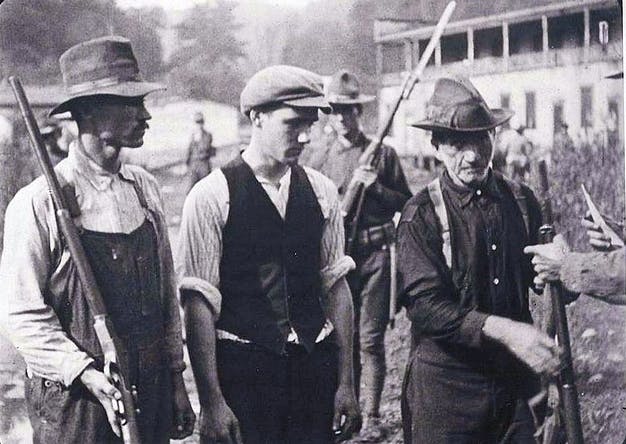The Secret History of Why Joe Manchin Hews to the Democrats
The ‘Mine Wars’ of the 1920s are the largest armed insurrection against America since the Civil War and — let us just say — haven’t been forgotten.

To understand why it was Senator Sinema — and not Senator Manchin — announcing a departure from the Democratic Party, it’s helpful to understand what might be called the secret socialist history of West Virginia.
West Virginia, now a ruby-red reliably Republican set of votes, was once the mountain home of labor politics in America and the site of some of the biggest labor conflicts in American history.
Among these is the Battle of Blair Mountain, part of the now forgotten Mine Wars of the 1920s, and the largest armed insurrection in America since the Civil War. It made January 6 look like a game of Tiddly Winks.
The seven-day battle, where 10,000 pro-union coal miners took up arms against an anti-union coalition of police, mine guards, and eventually American soldiers, marked the culmination of labor militancy in the state.
Many were sympathetic to the coal miner’s cause, as they labored under some of the worst working conditions in the country. Miners endured roof collapses, explosions, fires, near non-existent safety standards, and one of the highest fatality rates of any industry.
To compound this, many of the miners were children and all were paid low wages, much of which would go to the cost of living in a company town in which they were compelled to reside.
In “Thunder in the Mountains,” historian Lon Savage depicts the miners as oppressed laborers who periodically rose up against the coal companies.
“They had been crushed and killed on their jobs and fired from them when they tried to organize a union,” Mr. Savage writes. “They had been evicted from their company homes and machine-gunned in their union tents.”
In spite of this, the 1922 prosecution of about 500 of the pro-union marchers for murder, accessory to murder, and treason against West Virginia stifled any push for widespread unionization of miners under the United Mine Workers of America.
With the election of President Roosovelt in 1932 and then the New Deal, the state was minted as Democratic stronghold for decades to come, in no small part thanks to the pro-union sentiment developed during and before the mine wars.
This is the historical and political context in which Senator Manchin maneuvers in Washington, where he has emerged on the right wing of the Democratic Party. Yet back home, he heads the state’s Democratic Party.
Some of these lingering pro-labor sentiments can still be seen in the Mountain State, such as in the 2016 Democratic primary election results in which every county voted for Senator Sanders.
It should suffice to say that Mr. Manchin’s politics are quite different from those of the Blair Mountain combatants or Roosevelt, even if he’s benefitted from some of the political infrastructure they helped create.
Mr. Manchin is in many ways a vestige of the machine politics of the state and in that way far more entrenched in the Democratic Party of West Virginia than Ms. Sinema was in Arizona’s state party.
Since his election as governor in 2004, Mr. Manchin has reigned as the de facto kingpin of the Democratic Party of West Virginia, despite insurgent populists in his own party working to out-organize the old machine.
In the eyes of some critics, like the West Virginia Can’t Wait committee, Mr. Manchin and his political machine now represent the same interests that the miners fought against a century ago, those of large companies.
Most recently, Mr. Manchin demonstrated this in his vote against providing rail workers with seven days of paid sick leave, saying that “I do not believe it is the role of Congress to renegotiate a collective bargaining agreement that has already been negotiated.”
Even so, Mr. Manchin was endorsed by the United Mine Workers of America, the same union that militant agitators sought to join in the 1920s.
He has also been fairly well served by his position in the Democratic Party being able to secure major concessions from his own party including cutting major climate related provisions from some of the party’s recent legislation.
His position as a fossil-fuel centric holdout in the Democratic Senate has also historically buoyed his campaign coffers and inflated his polling numbers in the state.
Mr. Manchin’s family company has made millions of dollars in the coal industry, and he has received hundreds of thousands in campaign donations over the past two years from coal companies despite not being up for re-election until 2024.
In spring of 2022, when Mr. Manchin was one of the holdout votes for President Biden’s Build Back Better legislation, his popularity in West Virginia soared to 57 percent.
He has also held out in West Virginia as other statewide offices have gone to Republicans since 2000. Now all the state’s representatives, Senator Capito, and Governor Justice are Republicans, though Mr. Justice publicly switched parties recently — at a rally for President Trump in 2017.
Mr. Manchin, unlike Ms. Sinema, is a clear favorite to win the Democratic nomination in 2024, when he is next up for re-election and can expect the support of the national party as it defends its slim majority in the Senate.
These are among the reasons that Mr. Manchin has rejected overtures from Republicans to switch parties and to become an independent in the past, including earlier this year.
In April, he talked to CNN about one of these overtures, which was delivered by Senator Thune. The offer was for Mr. Manchin to become an independent who caucused with Republicans. He would receive GOP campaign support and committee leadership in return.
“John Thune is the most decent human being, a good friend of mine. But no, they know where I’m at,” he responded. “And Mitch McConnell knows he’s tried everything humanly possible. The bottom line is I am a West Virginia Democrat.”

